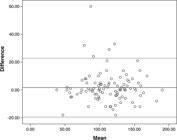Pregnancy is a time of important physiological, aesthetic and psychosocial changes.11.da Silva LS, Pessoa FB, Pessoa DT. Análise das mudanças fisiológicas durante a gestação: desvendando mitos. Rev Fac Montes Belos. 2015;8:1-16. The fear of childbirth is a common condition, involving 5 to 20% of women.22.O’Connel MA, Leahy-Waren P, Khashan AS, Kenny LC, O’Neil SM. Worldwide prevalence of tocophobia in pregnant women: systematic review and meta-analysis. Acta Obstet Gynecol Scand. 2017;96:907-20. Clinically, the pregnancy and puerperal period can be affected, increasing the preference for cesarean section on request. Brazil ranks as the second country in the world with the highest rate of cesarean sections (57%),33.United Nations (UN). The millennium development goals report [Internet]. 2015 [cited 2021 Apr 14]. http://www.un.org/millenniumgoals/2015_MDG_Report/pdf/MDG%202015%20rev%20%28July%201%29.pdf
http://www.un.org/millenniumgoals/2015_M...
and the fear of childbirth is probably associated with many of these procedures. Using the recent published Tokophobia Assessment Questionnaire, objective identification of pregnant women with phobic fear of childbirth is possible in the Brazilian context.44.Nunes RD, Traebert E, Seemann M, Traebert J. Tokophobia assessment questionnaire: a new instrument. Braz J Psychiatry. 2021;43:112-4. In addition, identifying factors which lead to this fear is important to guide and educate pregnant women and their families. However, in Brazil, there is no instrument that objectively evaluates this parameter, which makes it impossible to carry out assertive actions aimed at the Brazilian population. Thus, the Fear of Childbirth Motivators Questionnaire (Questionário de Motivadores do Medo do Parto, QMMP) was developed and validated specifically for the Brazilian sociocultural and clinical-obstetric context.
A cross-sectional study was conducted to estimate the reliability and validity of the proposed instrument. Pregnant women who attended prenatal consultations at a medical school clinic were included, and those with psychiatric conditions that made it difficult to understand the instrument or with absolute indications for cesarean section were excluded. A total sample of 266 patients was obtained. The guidelines for development and validation of the QMMP were supported by international recommendations.55.Mokkink LB, Terwee CB, Patrick DL, Alonso J, Stratford PW, Knol DL, et al. The COSMIN checklist manual [Internet]. 2012 Jan [cited 2021 Apr 14]. http://fac.ksu.edu.sa/sites/default/files/cosmin_checklist_manual_v9.pdf
http://fac.ksu.edu.sa/sites/default/file...
The psychometric properties were assessed using exploratory factor analysis (EFA).
Validity was assessed by applying an external instrument (the Penn State Worry Questionnaire) and the QMMP (Table 1) to 266 pregnant women. The QMMP was subsequently re-administered to 107 participants. The reliability of the instrument was given by the high Pearson correlation coefficient (0.940) and the intraclass correlation coefficient (0.969), both with p < 0.001. The central dispersion verified in the differences and averages of almost all responses during the first and the second application of QMMP, which was observed in the Bland & Altman graph, demonstrates its stability (Figure 1). This observation highlights the instrument as a good parameter to identify motivators of the fear of childbirth, reducing the possibility of random and dispersed responses. A general Cronbach’s alpha of 0.937 (Table 1) was obtained as a measure of the performance of the items, which corresponds to a high and satisfactory alpha, as well as favoring the overall reliability of the instrument and the retention of the 38 initial items. EFA identified items grouped into five components: fear of vulnerability and impotence, fear of physical and psychological consequences, fear of complications with the baby, fear of interference in the family relationship, and fear of obstetric procedures. Validation of these components makes it possible to ensure the provision of more assertive antenatal care with the QMMP.
Reliability analysis of the first application of the Fear of Childbirth Motivators Questionnaire (QMMP), Universidade do Sul de Santa Catarina, Brazil, 2020 (n = 266)
Bland-Altman graph for reliability analysis between the two applications of the Fear of Childbirth Motivators Questionnaire (QMMP), Universidade do Sul de Santa Catarina, Brazil, 2020 (n = 107).
Therefore, the 38-item QMMP is a reliable and valid instrument for the Brazilian population, and allows consolidation of the identification of factors possibly catalyzing the development of fear of childbirth.
Acknowledgements
This study was partially funded by Coordenação de Aperfeiçoamento de Pessoal de Nível Superior (CAPES; financing code 001).
References
-
1da Silva LS, Pessoa FB, Pessoa DT. Análise das mudanças fisiológicas durante a gestação: desvendando mitos. Rev Fac Montes Belos. 2015;8:1-16.
-
2O’Connel MA, Leahy-Waren P, Khashan AS, Kenny LC, O’Neil SM. Worldwide prevalence of tocophobia in pregnant women: systematic review and meta-analysis. Acta Obstet Gynecol Scand. 2017;96:907-20.
-
3United Nations (UN). The millennium development goals report [Internet]. 2015 [cited 2021 Apr 14]. http://www.un.org/millenniumgoals/2015_MDG_Report/pdf/MDG%202015%20rev%20%28July%201%29.pdf
» http://www.un.org/millenniumgoals/2015_MDG_Report/pdf/MDG%202015%20rev%20%28July%201%29.pdf -
4Nunes RD, Traebert E, Seemann M, Traebert J. Tokophobia assessment questionnaire: a new instrument. Braz J Psychiatry. 2021;43:112-4.
-
5Mokkink LB, Terwee CB, Patrick DL, Alonso J, Stratford PW, Knol DL, et al. The COSMIN checklist manual [Internet]. 2012 Jan [cited 2021 Apr 14]. http://fac.ksu.edu.sa/sites/default/files/cosmin_checklist_manual_v9.pdf
» http://fac.ksu.edu.sa/sites/default/files/cosmin_checklist_manual_v9.pdf
Publication Dates
-
Publication in this collection
17 May 2021 -
Date of issue
Jul-Aug 2021
History
-
Received
14 Feb 2021 -
Accepted
5 Apr 2021



